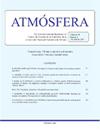Spatiotemporal distributions of ultraviolet radiation from OMI orbital data and relationships with Total O3 and Total NO2Spatiotemporal distributions of ultraviolet radiation from OMI orbital data and relationships with Total O3 and Total NO2
IF 1
4区 地球科学
Q4 METEOROLOGY & ATMOSPHERIC SCIENCES
引用次数: 0
Abstract
Ultraviolet radiation (UVR) plays a key role in the photochemistry of the atmosphere, through absorption or dispersion processes by its constituents (ozone, cloudiness, aerosols, and pollutants in the troposphere). Quantifying UVR in a spatial-temporal way and knowing its relationships with modulating variables is important for Rio Grande do Sul State, a region with one of the highest skin neoplasms rates in Brazil. Ultraviolet radiation data for the region, acquired by the Ozone Monitoring Instrument (OMI) for the 2006 to 2020 period, and expressed in terms of Erythemal Daily Dose (EDD), was used in this study, with the objectives of quantifying UVR incidence, its stability in time and spatial distribution. Our results show that for this study area the radiation varies from 3300 to 3700 J/m2, with a latitudinal gradient of 66.7 J/m2 per degree, with maxima recorded in December (6028 J/m2, summer) and minima in June (1123 J/m2, winter). 29.76% of the area had a long-term decreasing trend (z value =5), while 6.19% of the area had an increasing trend (z value=2). During the studied period of fifteen years, occurrences of high values of Erythemal Daily Dose are negatively correlated with Total O3 as the dominant relationship, being also recorded positive or negative correlations with Total NO2, depending of the investigated epoch or region.OMI轨道数据紫外辐射时空分布及其与总O3和总NO2的关系
紫外线辐射(UVR)通过其成分(臭氧、云层、气溶胶和对流层中的污染物)的吸收或扩散过程,在大气的光化学中起着关键作用。以时空方式量化紫外线辐射并了解其与调节变量的关系,对于巴西皮肤肿瘤发病率最高的地区之一南大德州来说非常重要。本研究采用臭氧监测仪器(OMI) 2006 - 2020年的区域紫外线辐射数据,以红斑日剂量(EDD)表示,目的是量化UVR发生率及其时空分布的稳定性。结果表明:研究区辐射在3300 ~ 3700 J/m2之间变化,纬度梯度为66.7 J/m2 /度,其中12月最大(夏季6028 J/m2), 6月最小(冬季1123 J/m2)。29.76%的面积长期呈下降趋势(z值=5),6.19%的面积长期呈上升趋势(z值=2)。在15年的研究期间,红斑日剂量高值的发生与总O3负相关,是主要关系,也与总NO2正相关或负相关,取决于调查的时代或地区。
本文章由计算机程序翻译,如有差异,请以英文原文为准。
求助全文
约1分钟内获得全文
求助全文
来源期刊

Atmosfera
地学-气象与大气科学
CiteScore
2.20
自引率
0.00%
发文量
46
审稿时长
6 months
期刊介绍:
ATMÓSFERA seeks contributions on theoretical, basic, empirical and applied research in all the areas of atmospheric sciences, with emphasis on meteorology, climatology, aeronomy, physics, chemistry, and aerobiology. Interdisciplinary contributions are also accepted; especially those related with oceanography, hydrology, climate variability and change, ecology, forestry, glaciology, agriculture, environmental pollution, and other topics related to economy and society as they are affected by atmospheric hazards.
 求助内容:
求助内容: 应助结果提醒方式:
应助结果提醒方式:


